With FBI Supervisor’s Admission Of Feds’ Synergy With Big Tech, The ‘Private Company’ Defense Is Dead
The FBI successfully meddled in the 2020 election via an influence operation that pushed Big Tech platforms such as Facebook, Twitter, and Youtube to suppress certain information online, putting to bed defenses that tech giants can suppress whatever speech they want because they’re private companies, not government actors. Confirmation of this meddling came during a deposition with FBI Supervisory Special Agent Elvis Chan which stemmed from a Big Tech censorship lawsuit from Missouri Attorney General Eric Schmitt and Louisiana Attorney General Jeff Landry.
In his testimony, Chan admitted that intelligence agencies such as the Cybersecurity and Infrastructure Security Agency, the Office of the Director of National Intelligence, the Department of Homeland Security, and the FBI hosted weekly meetings with Big Tech ahead of the 2020 election in an attempt to encourage censorship. Chan was present and gave direction at most of these meetings.
“What I said was although we have not seen any computer intrusions into national-level political committees or election officials or presidential candidates at this time, we ask you to remain vigilant about the potential for hack-and-dump operations, or something to that effect,” Chan testified.
This established pipeline of “strategic information” gave Big Tech companies a scapegoat to justify their suppression of content they deemed “disinformation” — including the Hunter Biden laptop story.
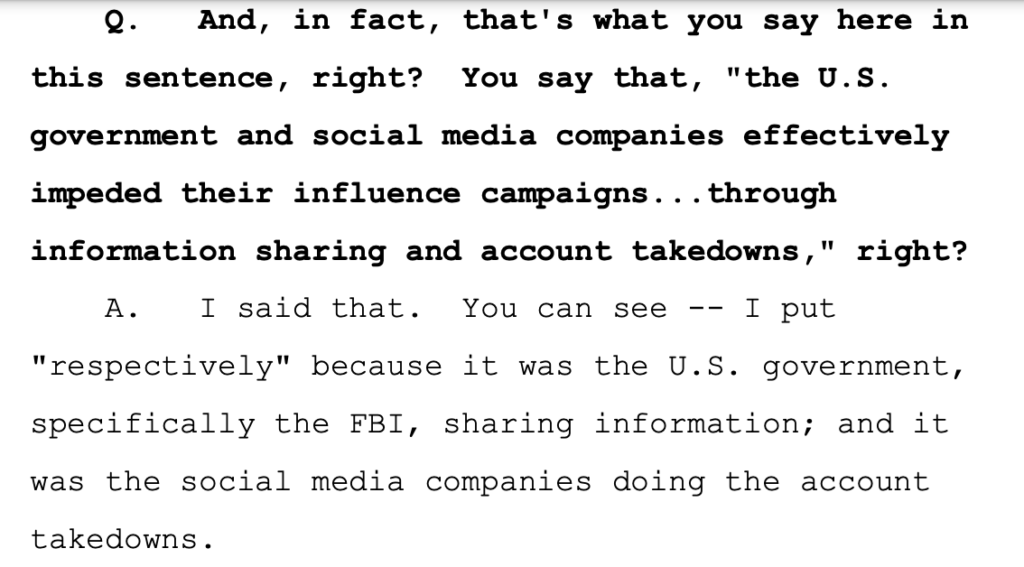
It was around that same time that the FBI began funneling information about “domestic disinformation campaigns in the 2020 election cycle” to Big Tech censors for removal. According to Chan, the FBI began “passing information to social media companies” after the Department of Justice advised the agency that “this type of information was criminal in nature.”
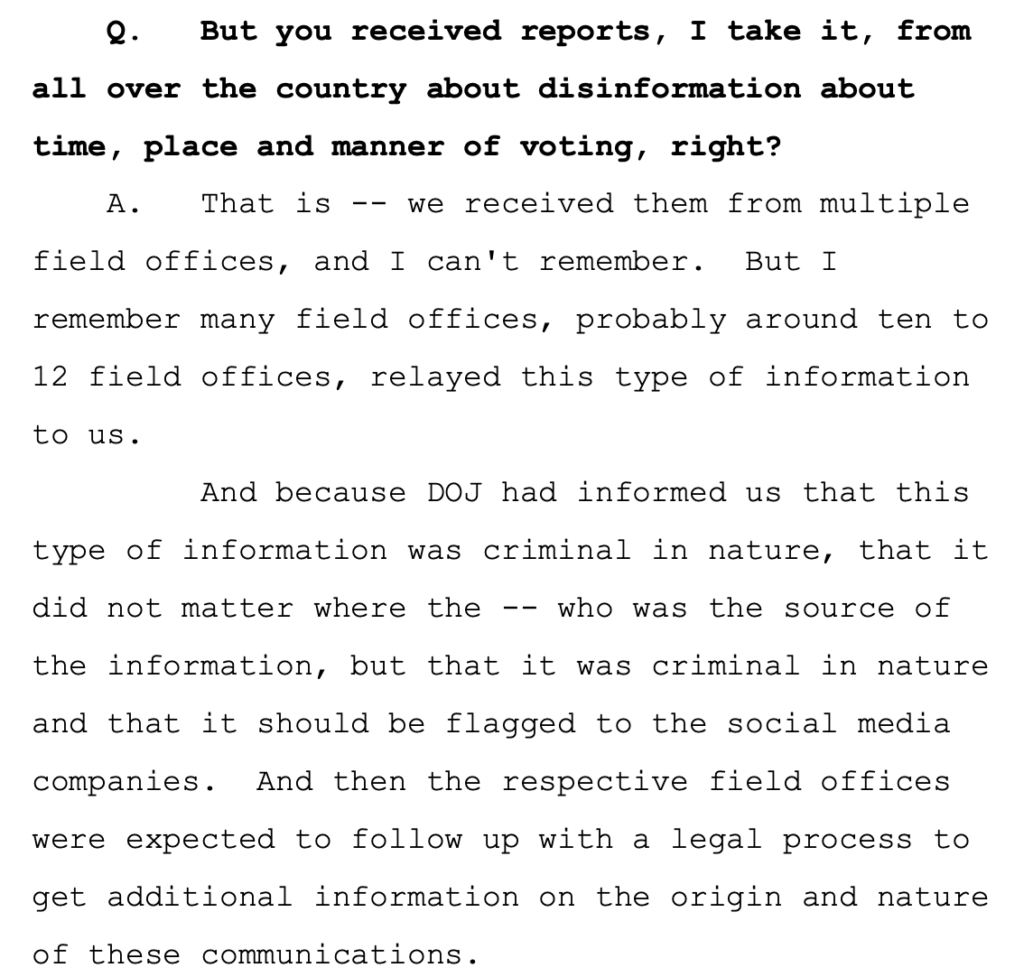
“So the Department of Justice advised you that it’s criminal and there’s no First Amendment right to post false information about time, place, and manner of voting?” the interrogation counsel asked.
After a brief objection from his counsel, Chan affirmed, “That was my understanding.”
Chan later admitted that the government was not always successful but still managed to get Big Tech to remove or censor content at least 50 percent of the time.
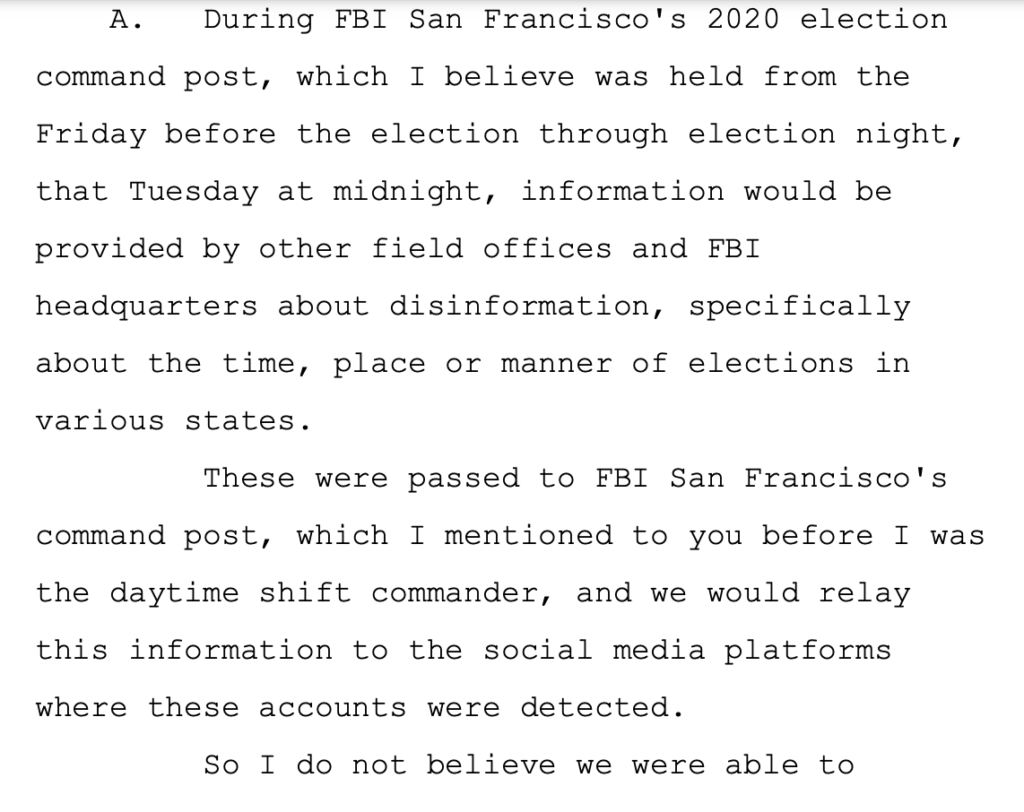
Earlier in the deposition Chan, who said he believes Russia could have influenced the 2016 election, claimed the FBI’s warnings were rooted in the fear that a 2016 DNC-style hack “could happen again.”
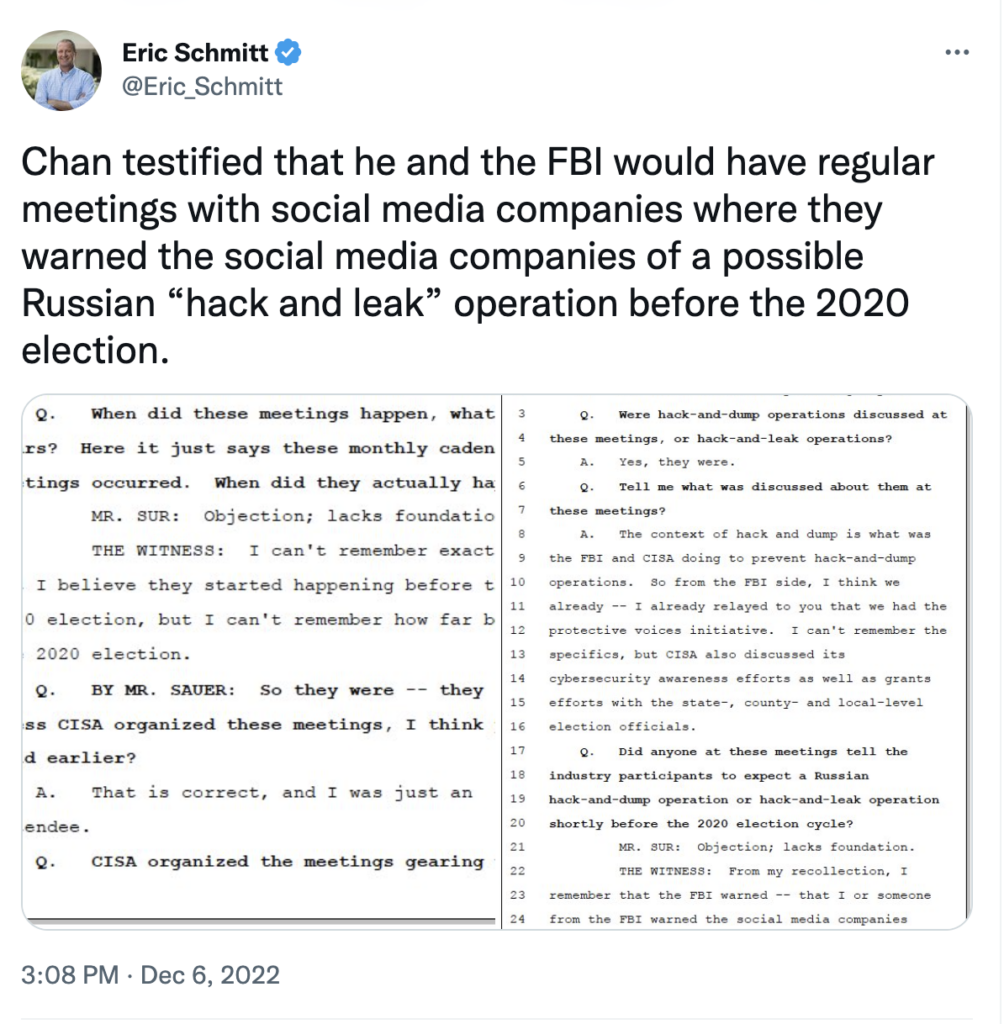
Chan’s revelation confirms what Facebook CEO Mark Zuckerberg told podcast host Joe Rogan in August 2022. Nearly two years after Big Tech collectively stifled the spread of Hunter’s sketchy overseas business dealings, Zuckerberg admitted it was the FBI’s regular suppression instructions that inspired Facebook to reduce the distribution of posts about Biden family corruption.
Not only did Chan put the censors at Silicon Valley giants on notice “about a potential for hack-and-dump operations from the Russians and the Iranians on more than one occasion,” but so did several other senior intelligence officials.
It was during one of these routine meetings that Chan said Facebook asked the FBI if it “has any information they could share about the Hunter Biden investigation.” The FBI declined to answer.
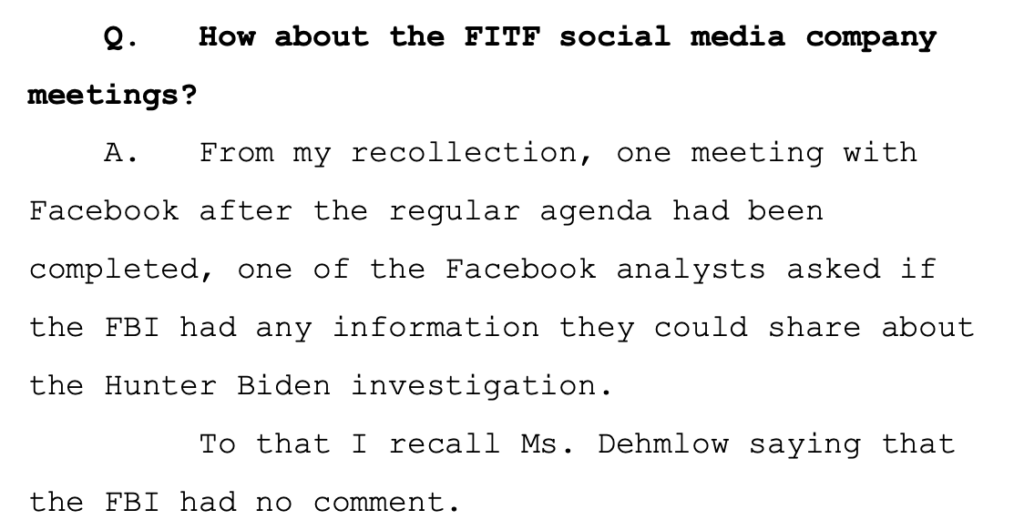
Chan’s denial that the FBI ever discussed Hunter Biden with Big Tech companies directly contradicts testimony from Yoel Roth, the former head of trust and safety at Twitter.
In December 2020, Roth declared to the Federal Election Commission that Twitter throttled the New York Post’s reporting about Hunter Biden’s laptop because it “could have been obtained through hacking, based on, among other things, the type of material, the sourcing described in the articles, and the information security community’s initial reactions.”
“I was told in these meetings that the intelligence community expected that individuals associated with political campaigns would be subject to hacking attacks and that material obtained through those hacking attacks would likely be disseminated over social media platforms, including Twitter,” Roth testified. “I also learned in these meetings that there were rumors that a hack-and-leak operation would involve Hunter Biden.”
Chan, however, denied during his deposition that Roth was referencing the FBI’s collusion meetings with Big Tech. Instead, Chan said Roth was likely pointing to information from the “private sector information security community.”
He later confirmed that the FBI maintained a working censorship relationship with Roth “until the day” after the 2022 midterm election.
Chan also disclosed his belief that it was pressure from Congress that encouraged Big Tech censors to suppress certain information.
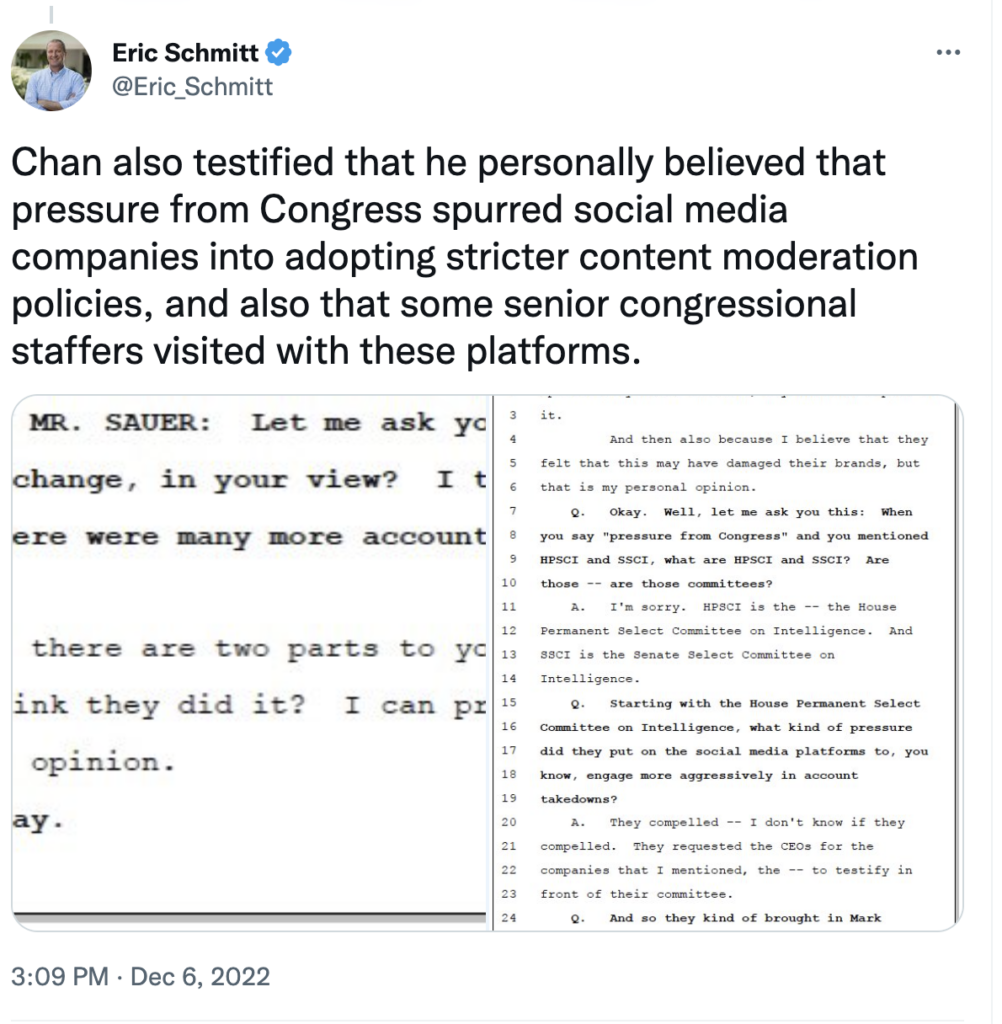
Chan sourced that belief to his knowledge that Facebook, Twitter, and Google received “visits” from congressional staffers who worked for the legislative committees pushing for more tech censorship.
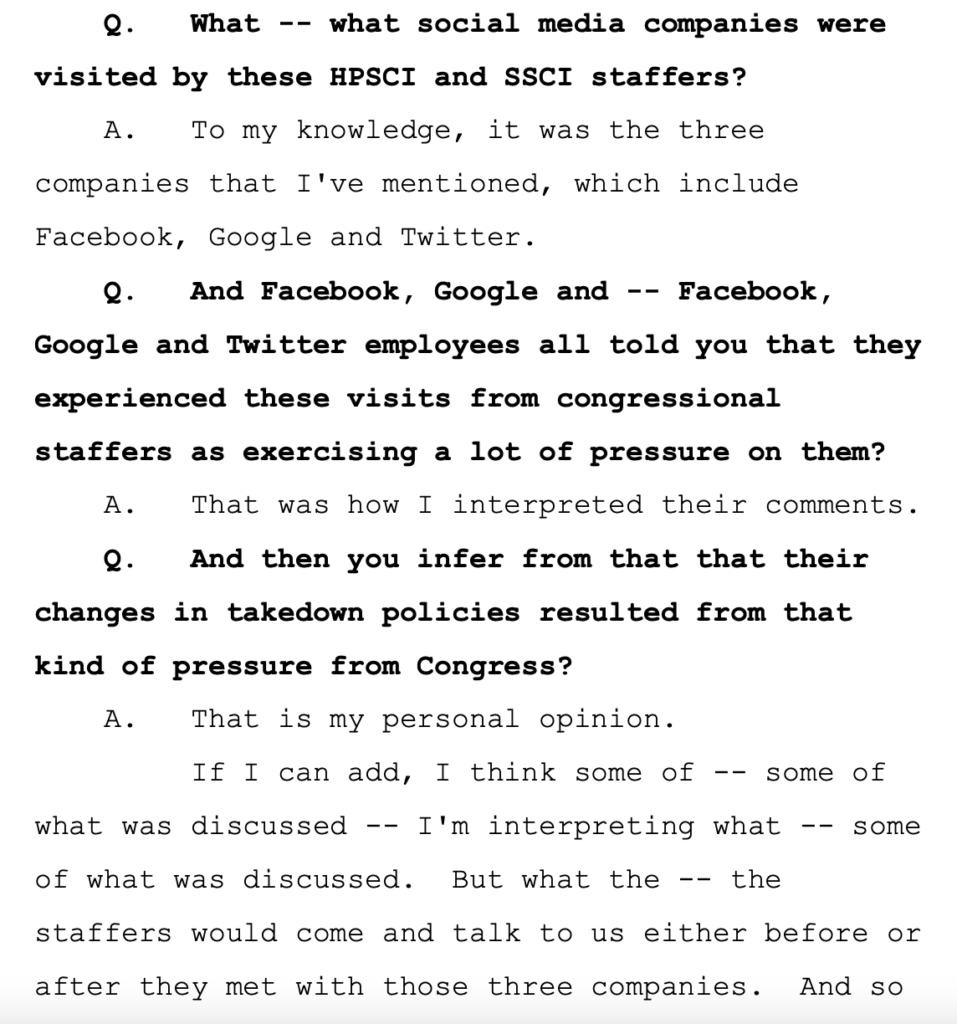
For too long, corporate media and politicians excused Big Tech companies’ assault on the First Amendment under the guise that Twitter, Facebook, and Google are private actors. After years of unchecked censorship and suppression, in coordination with the feds, lawmakers, and the White House, those defenses couldn’t be further from the truth.
Chan’s testimony, combined with admissions from Silicon Valley’s top censors, demonstrates that the speech-stifling objectives and actions of Big Tech and the government are indistinguishable. Big Tech is so in sync with big brother that the former reliably does the bidding of the latter — increasingly without even needing to be asked. That kind of censorship is not protected by the First Amendment; there’s no longer anything “private” about these malign actors.

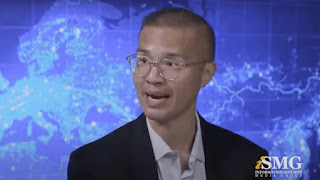



Post a Comment